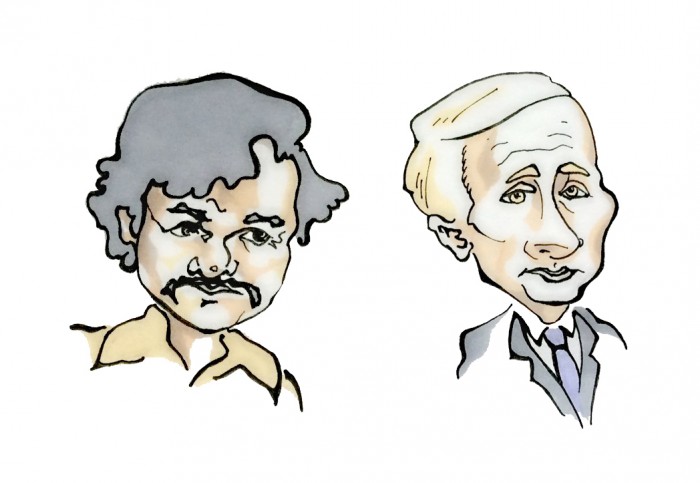Treading the line between documentary and crime thriller, Netflix’s newest original series Narcos—short for the Spanish ‘narcotraficante,’ or drug trafficker—tells the tale of Pablo Escobar’s rise to power and the blood of Colombia shed along with it. Faithful to history, the show gives a fairly accurate depiction of the rise and sheer power of Escobar’s empire—essentially a mini-state within Columbia, raking in $60 million per day and controlling 80 per cent of the world’s cocaine supply. In addition the duality of Escobar himself is of particular focus, as he ruthlessly murdered Colombian police, judges, and politicians, while simultaneously cultivating a ‘Robin Hood-esque’ image due to his charity towards Colombia’s poorest. Escobar’s historically inevitable fall is notably saved for a later season, a move that compromises the show’s unabashed criticism of the United States' imperialist politics in the area.
Narcos is keen on exposing the history behind the U.S.’s controversial decision to subtly violate Colombian sovereignty and intervene in the country’s affairs. Right from the very first episode, U.S. Drug Enforcement Agency (DEA) agent Steve Murphy (Boyd Holbrook), reveals the primary motivation behind the U.S. involvement in Columbia was not the 3,245 drug-related murders that plagued Miami from ‘79 to ‘84, but rather president Ronald Reagan's administration’s concerns over the health of Miami’s economy in the face of billions of dollars leaving the U.S. annually. By depicting Reagan’s cabinet in such a purely economic light and complementing the character of such policies with equally laughable news footage that show the cabinet ravenously quibbling over jelly beans, the show seems to critically posit an image of the U.S. that is in line with Marx’s definition of the state laid out in his Communist Manifesto: Namely that it is simply an institution designed for maintaining economic interests of the ruling class.
This tension between the espoused freedom-driven rhetoric of capitalism and its actual economic concerns is explored throughout the entirety of the show: The relationship between agent Murphy and his wife Connie Murphy (Joanna Christie), where Connie is constantly out of the loop and voices unheard opinions, is the show’s clear demonstration of the marketization of human relations found in capitalism. Agent Murphy, constantly pre-occupied with the ultra-violent hunt for Escobar, does not see any marketable ‘use’ for his wife within the conflict, and thus Murphy, and at large the entire show, relegates her to the sidelines of dependency.
Similarly, Escobar’s bid for presidency, depicted in the show, clearly demonstrates the tension between violence and the rule of law outlined by capitalist democracies. Escobar, who is portrayed as genuinely wanting to bring palpable changes for Colombia’s poorest and fulfill his Robin Hood archetype, is ultimately barred from the legal realm due to his violent activities and his infamous mugshot that testifies to them; however, the show is also apt at pointing out that the ‘legal’ democratic state Escobar is contending with is similarly built on a foundation of violence, as it highlights the Columbian governors often shady use of violence for the pursuit of personal agendas.
One of the show’s biggest tensions, however, is the ever-impending capture of Escobar and, unlike the anti-capitalist tensions discussed above, Narcos resolves Escobar’s capture in perhaps the most economically driven ways possible. They don’t. Following Escobar’s rise from rags to riches, his role as the world’s most powerful drug dealer, and his subsequent lavish ‘imprisonment’ at ‘La Catedral,’ the show ultimately covers the majority of Escobar’s tale.
In a move that mirrors the modern trend for ‘sequel-itis’ infamously emulated by the Harry Potter, Hunger Games, and Hobbit franchises, the show leaves the audience wondering what could possibly fit into a whole second season. Given the show’s aforementioned explicit questioning of capitalist economic relations, such a decision comes off as highly contradictory, and raises a question of whether or not a T.V. show with anti-capitalist views can truly ever escape a commercial paradigm and leave its professed views untainted. Similar to French filmmaker François Truffaut’s oft-quoted “There’s no such thing as an anti-war film,” could it be that there is no such thing as an anti-capitalist film? Such a film will primarily have to portray, and thus glorify, the excessive wealth and extravagant lifestyles that naturally accompany owners of capital. As a result, they will always be entangled within the webs of real world economics. While there might be ‘ethical’ critiques of capitalism out there, if any social commentary is to make an impact by affecting as many people as the Netflix nexus holds, it seems this paradox is unavoidable.








